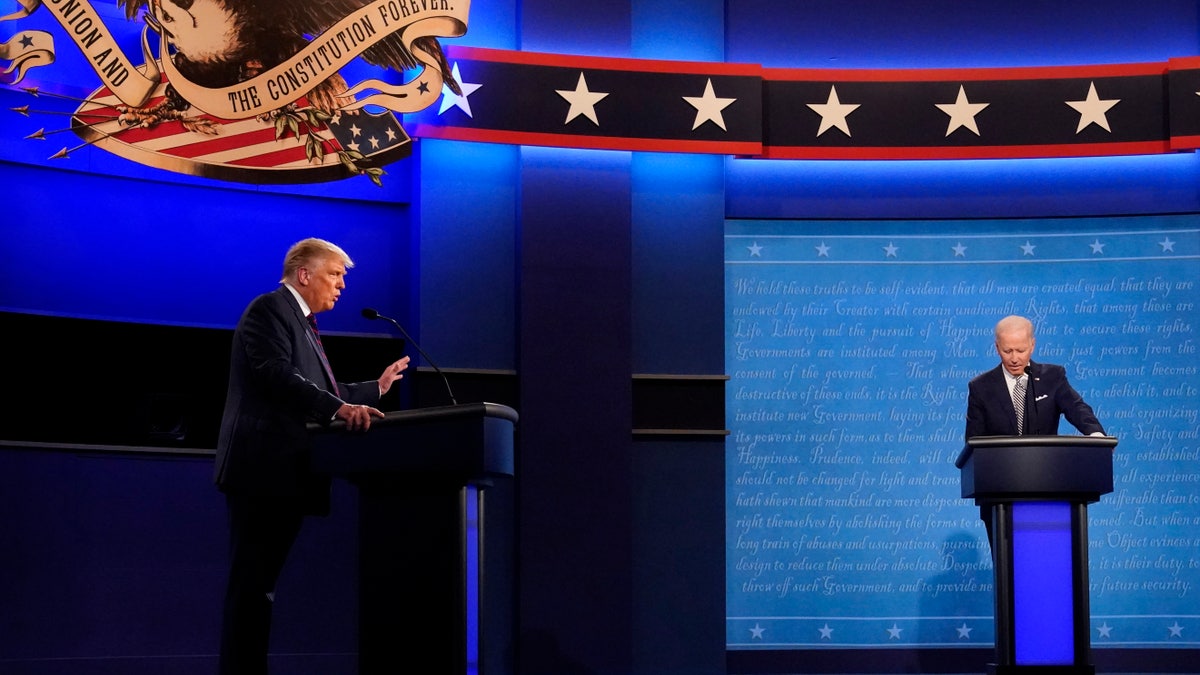WSJ poll: Biden holds 14-point lead over Trump
Byron York, Fox News contributor, on Biden's national lead in a new NBC News/WSJ poll.
With the clock ticking toward Election Day, Democratic presidential nominee Joe Biden holds a nearly 10-point lead over President Trump in an average of the latest national polls.
But in the crucial battleground states where the presidential election will be won or lost, the most recent public opinion surveys point to a tighter race between the former vice president and Trump.
THE VICE PRESIDENTIAL DEBATE, OFTEN AN AFTERTHOUGHT, TAKES ON OUTSIDED IMPORTANCE
With four weeks to go until Nov. 3, an average of the latest national polls compiled by Real Clear Politics indicates Biden leading Trump by 9 points, up from a 6.9 point advantage a month ago.

President Donald Trump and Democratic candidate former Vice President Joe Biden participate in the first presidential debate Tuesday, Sept. 29, 2020, at Case Western University and Cleveland Clinic, in Cleveland, Ohio. (AP Photo/Julio Cortez)
The average includes a new CNN survey released Tuesday that shows Biden surging to 16 point lead over the president – 57%-41% - among likely voters nationwide. The CNN poll was conducted entirely after last Tuesday’s first presidential debate between Biden and Trump and mostly after the president’s hospitalization last Friday after contracting COVID-19.
The average also includes an NBC/Wall Street Journal survey conducted after the first debate but before the president tested positive for the coronavirus that indicated Biden up by 14 points. The CNN and NBC surveys were conducted by live telephone operators.
"There’s some sense that Biden got a little bit of a bump not only out of the debate, but with the president getting diagnosed with COVID," Daron Shaw, the Republican partner on the Fox News Poll and a member of the Fox News Decision Team, noted.
Four years ago at this point in the 2016 presidential election, Democratic presidential nominee Hillary Clinton held a 4.6 point advantage over Trump. Clinton’s lead would grow to roughly 7 points over Trump by mid-October before shrinking to 3.2 points on the eve of the November election. Clinton ended up winning the national popular vote by 2.1 points.
But the race for the White House is not a battle for the national popular vote. It’s a fight for the states and their electoral votes. And four years ago Trump narrowly edged Clinton in a number of the key general election battlegrounds – including flipping from blue to red the key swing states of Florida, Michigan, Pennsylvania, and Wisconsin by razor-thin margins, to produce a large Electoral College victory to win the presidency.
THE TOP 5 VICE PRESIDENTIAL DEBATE MOMENTS IN HISTORY
An average of the latest swing state polls compiled by Real Clear Politics shows Biden up by 3.5 points in Florida, 5.8 points in Michigan, 5.6 points in Wisconsin, and 6.5 points in Pennsylvania. Four years ago Clinton held the edge over Trump in the final polls in Michigan, Pennsylvania and Wisconsin, with Trump narrowly leading in the election eve surveys in Florida.
Biden also edges the president by 3.4 points in an average of the latest polling in Arizona, 1.2 points in North Carolina, 1.2 points in Ohio, .5 points in Iowa, and .3 points in Georgia, all states that Trump won four years ago. In Texas, a longtime GOP stronghold, an average of the most recent surveys indicates Trump up by 3.2 points over Biden.
And in three states that Clinton narrowly carried in 2016, Biden currently tops Trump by 5.3 points in Nevada, 8.4 points in New Hampshire, and 9.4 points in Minnesota.
"There’s always a lag between statewide polls and the national polls and its one of the reasons why it’s important to continue to do national polling," Shaw, a polling veteran of numerous Republican presidential campaigns, pointed out.
"As battleground state polls come in over the next few days, my guess is that they’ll probably show something similar, that is a very small tick up for Biden," he added.
Biden has been cautious when commenting on public opinion polls while Trump has repeatedly blasted most of them for months.
The president on Monday – as he vowed to return to the campaign trail “soon!!!” as he recovers from COVID-19 – once again tweeted that “The Fake News only shows the Fake Polls.”
Election Day is still four weeks away – which is an eternity in campaign politics. But voting is now well underway in much of America.
Early in-person voting at polling stations is now underway in 17 states. And 37 states have already started sending absentee ballots to registered voters who’ve requested them.






